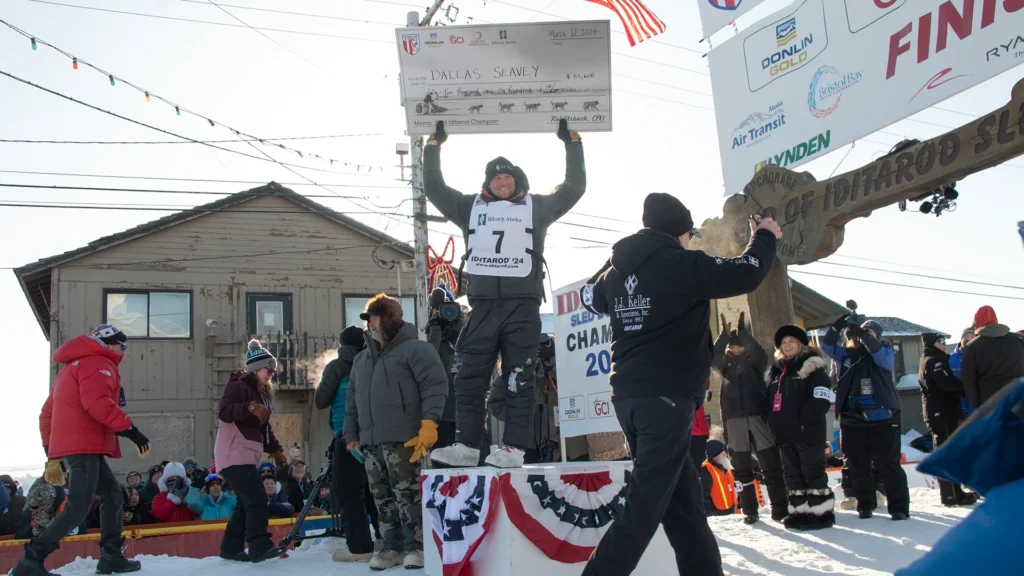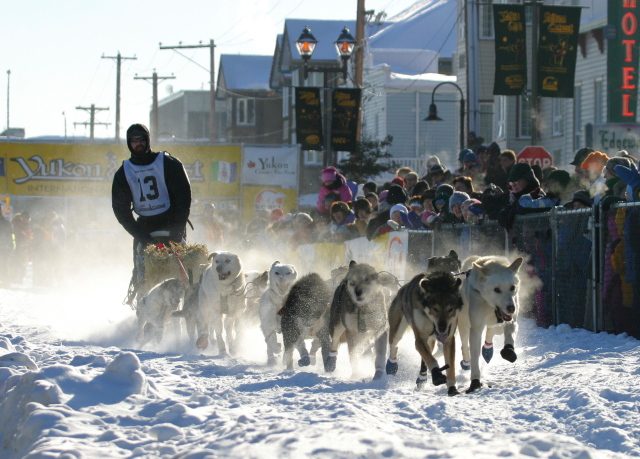The mighty Yukon took center stage in the Iditarod Wednesday, as mushers tackled the longest single run of the race — more than 120 miles down the iconic Alaska river. And in the end it was Mitch Seavey who was the first to Ruby, earning him the coveted “Spirit of Alaska” award.
KNOM’s Matthew Smith spoke to mushers as they made their way along the river.
The trail to Tanana was by all accounts a good one: varied terrain over frozen rivers and lakes, and through picturesque hills and snow-covered forests. Strong run kept the dog teams coming in and the checkpoint buzzing with energy. With many teams coming off longer rests — some even taking their required 8-hour break — mushers took off late Tuesday night and into Wednesday to tackle what many expected to be one of the toughest legs of the trail: about 120 miles to Ruby — almost all of it on the river.
The trail was slow going, taking its toll on both musher and dogs alike.
“The dogs hit highs and lows during the race and right now they’re going through a little bit of a low,” said Kotzebue musher John Baker. “So tomorrow they’ll probably be feeling a little bit better than today.”
Baker was just one of dozens of teams camping along the unfamiliar stretch of river, many stopping to make camp several times through the day. Mushers dozed in their sleds and dogs rested in strew as cook fires bubbled with hot water for the next snack. And as mushers and dogs rested, a steady flow of traffic continued to churn up the trail — turning what had been a fairly well-packed trail into loose, sugary snow.
New Zealand musher Curt Perano echoed the thoughts of many who found their teams going from a brisk pace to a slow trot.
“There are sections on this trail that are soft and slow. It does slow a team down and it does mean the guys have to work a lot harder to get through it,” he said.
And it wasn’t just a deteriorating trail. Extreme cold and strong winds as teams crept closer to Ruby left Bethel’s Pete Kaiser without much rest at all.
“It’s harder to rest when you’re camped out on the trail and it’s 40 and 50 below. But last night I had a heck of a time staying awake. Then I got in here and should have been able to sleep like a log, but I was somewhat restless,” said Kaiser.
But then, amid the frozen windblown stretches of seemingly endless river: An oasis — roughly at the midpoint of the 120 miles between Tanana and Ruby.
“They started showing up at 7 this morning, and some were pretty cold and had gear that definitely had to be warmed up and dried out,” said Carol Huntington. She and her husband have lived at Kokrine Hill’s Bible Camp for the last 6 years. She has roots in western Alaska, and runs a summer camp for more than 200 kids each year.
But on Wednesday, she was running an unofficial checkpoint — offering hot water and warm meals to mushers slowly making their way downriver.
Norwegian rookie Thomas Waerner was very appreciative. He stopped at the impromptu checkpoint, making a much-needed improvement to his hood, before heading back onto the trail.
“My brother in law Tommy was here,” said Huntington. “He just happened to show up here and helped sew [Waerner’s] ruff back onto his parkie.”
Leaving the warmth of “the bible camp” wasn’t easy — and many teams parked uphill protested strongly as mushers attempted a u-turn back on to the river. Closer to Ruby the wind blew stronger, drifting over the trail — making the river’s frozen surface look like the scales on a fish skin — a pattern of bumps and drifts set against the otherwise smooth surface of snow.
Miles later, it came down to a close race between the Seaveys, with Mitch Seavey leading his son Dallas into the Ruby checkpoint. The elder Seavey earned the “Pen Air Spirit of Alaska” award — two round trip tickets anywhere the airline flies, and a spirit mask by Bristol Bay artist.
Seavey says he was confused to be first into Ruby — and he’s not sure if he likes it.
“I didn’t intend to be here first at all…I don’t even like being in first this early in the race,” he said.
By nightfall more than 10 teams had made it to Ruby — including former race leader Martin Buser, Nome’s Aaron Burmesiter, and Bethel’s Peter Kaiser.
The long run to Ruby was grueling, and mushers seemed eager for a well-deserved rest. But as Mitch Seavey bedded his dogs down, Jeff King blew right on through — which means the leader of this year’s Last Great Race is far from certain.







